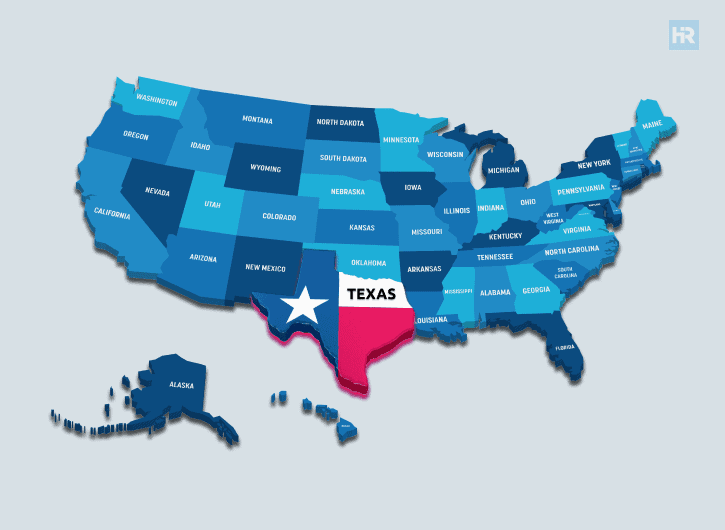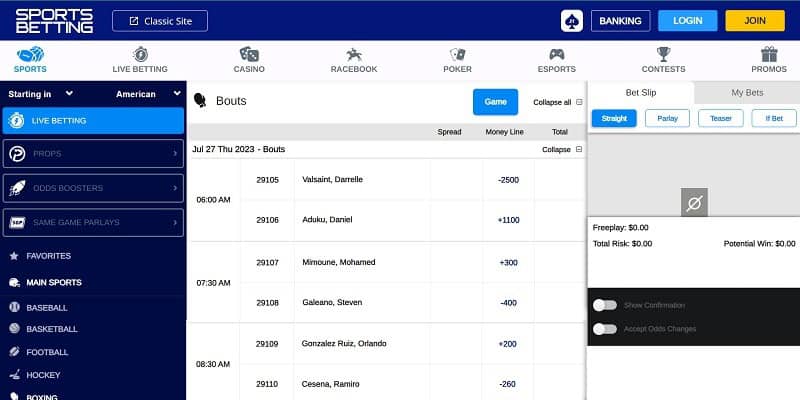Online gambling and sports betting are among the most debated topics in Texas, a state historically known for its conservative stance on gambling.
While most forms of online gambling, including casinos and poker, remain illegal, recent discussions in the Texas Legislature suggest a shift may be on the horizon.
With neighboring states reaping significant revenue from legal gambling, Texas faces mounting pressure to reconsider its laws.
Here’s everything you need to know about sports gambling in the Lone Star State.
Is Sports Betting Legal in Texas?
Sports betting and most other forms of gambling remain illegal in Texas. Despite the 2018 U.S. Supreme Court decision that allowed states to legalize sports betting, Texas has yet to pass such legislation. Efforts to legalize sports betting have been made, but none have been successful to date. This means there are no legal Texas sports betting sites currently available for residents.
However, it’s worth noting that Daily Fantasy Sports (DFS) platforms continue to operate in the state.
Beyond sports betting, the state’s gambling laws are highly restrictive. Casino gambling is largely banned, with only a few Native American casinos operating under federal law.
Poker rooms operate in legal gray zones, and the state permits parimutuel wagering, a state lottery, and charitable bingo.
Texas remains one of the largest untapped markets for sports betting, making it a key state to watch in ongoing legislative discussions.
| Category | Status in Texas |
| Online Sports Betting | Illegal |
| Retail Sportsbooks | Illegal |
| Daily Fantasy Sports (DFS) | Legal (Gray Area) |
| Horse Racing Betting | Legal |
| Neighboring States with Legal Betting | Louisiana, Arkansas, Oklahoma |
The History of Sports Betting Laws in Texas
PASPA Repeal and Federal Developments
The 2018 repeal of the Professional and Amateur Sports Protection Act (PASPA) marked a turning point for sports betting in the U.S., allowing states to legalize and regulate sports wagering.
While over 30 states have embraced legal sports betting since then, Texas has remained resistant due to its conservative political landscape.
State Legislative Efforts
Efforts to legalize sports betting in Texas gained momentum in 2021, with proposals for a constitutional amendment that would allow regulated wagering.
The initiative was backed by major players, including Jerry Jones, owner of the Dallas Cowboys, and Tilman Fertitta, owner of the Houston Rockets, who argued that legalization could boost fan engagement and state revenue.
In 2023, new bills were introduced to establish a legal framework for mobile sports betting and allow limited casino-style gambling.
Despite bipartisan support and heavy lobbying efforts, the bills failed to gain traction in the Senate, largely due to opposition from conservative lawmakers and influential anti-gambling advocacy groups.
Neighboring States and Market Potential for Online Gambling in Texas

Texas’s neighboring states have embraced legal gambling, creating competitive markets that draw Texans across state lines.
Louisiana, for instance, has become a hub for sports betting, with its online sportsbooks generating over $250 million in revenue in 2023. Much of that success is tied to legal online sports gambling, which draws bettors – including many Texans – across state lines. This highlights the immense market potential for regulated gambling.
In Oklahoma, tribal casinos continue to report steady growth. Under tribal compacts, they offer a mix of gaming options, including limited sports wagering.
According to the American Gaming Association, the absence of legal sports betting in Texas leaves an untapped market estimated at $6 billion annually in unregulated wagers.
A report by Eilers & Krejcik estimates Texas could generate over $360 million in direct tax revenue annually from legalized sports betting while adding $2.6 billion in economic output and over 8,000 jobs.
Proponents like Texas Rangers co-owner Neil Leibman highlight that this revenue could be directed toward education, infrastructure, or reducing property taxes.
As neighboring states capitalize on legal sports betting, many Texans are traveling across state lines to participate, further highlighting the economic loss for Texas.
GeoComply data highlights the significant demand for legal sports betting in Texas, with over 1.48 million geolocation checks (location verifications to comply with betting laws) recorded during the NFL regular season from September 5, 2024, to January 5, 2025.
This figure reflects Texans attempting to access legal sportsbooks despite the state’s lack of regulation.
As Texans flock to Louisiana and Oklahoma to gamble legally, the pressure mounts on Texas lawmakers to capitalize on this revenue and prevent further economic loss to its neighbors.
The HJR 134 Explained
House Joint Resolution 134 (HJR 134), introduced by State Representative Sam Harless, proposes a significant shift in Texas’ gambling laws by seeking to legalize sports betting through a constitutional amendment.
If approved by the legislature, this amendment would be placed on the November 2025 ballot for voter decision. Targeting professional sports teams, professional golf organizations, and Class 1 racetracks operational as of January 1, 2025, the resolution aims to authorize these entities to host sports betting.
The passage of HJR 134 through the Texas legislature involves several steps and requires approval from both the House and the Senate.
If voters approve the amendment, sports betting’s earliest implementation date would be in 2027, following the next legislative session, during which the necessary regulations and operational frameworks would be established.
Proponents of the bill argue that legalizing sports betting could generate significant tax revenue and improve fan engagement. However, the proposal faces opposition from conservative lawmakers and advocacy groups concerned about the potential social costs of expanding gambling.
This legislative effort reflects a broader trend. As neighboring states have seen economic benefits from legalized gambling, the pressure on Texas to reconsider its stance on sports betting is increasing.
Benefits & Drawbacks to Legalizing Sports Betting Texas
As momentum builds for legal sports betting in the Lone Star State, supporters and opponents alike are making their cases heard.
On one hand, the potential for increased state revenue and fan engagement is hard to ignore. On the other hand, concerns over social consequences and the allocation of tax dollars continue to spark debate. Below, we summarize the key arguments for and against sports betting in Texas.
Arguments For Legalization
Proponents of legal sports wagering emphasize the economic opportunity it presents. They argue that by regulating the industry, Texas could generate significant tax revenue that could be funneled into critical areas such as education, infrastructure, or property tax relief.
Many also note that Texans are already placing bets without a legal option – just not within a framework that benefits the state. By making these wagers official, lawmakers would increase public revenue, create jobs, and boost tourism for major sporting events.
Supporters argue that regulation helps the economy and strengthens consumer protections. Unlike offshore and illegal platforms, licensed operators uphold accountability, reducing fraud and irresponsible practices.
Arguments Against Legalization
Opponents, however, warn of the societal costs. Gambling addiction can quickly spiral, leading to financial hardship, family stress, and even mental health crises.
Critics argue that any fiscal benefits from taxes might be overshadowed by increased social services spending, law enforcement demands, and other costs tied to gambling-related problems.
Religious and conservative groups often stand firmly against any gambling expansion, citing moral objections and the potential for gambling to erode community values.
Who’s Influencing Online Gambling Laws in Texas?
The push to legalize sports betting in Texas involves a wide range of stakeholders, each with their own interests and strategies:
Professional Sports Teams:
- Teams like the Dallas Cowboys, Houston Texans, and San Antonio Spurs are vocal proponents.
- They argue that legal sports betting could enhance fan engagement and generate new revenue streams.
Conservative Lawmakers and Advocacy Groups:
- Many remain opposed, citing moral concerns and the potential for social harm.
- Their steadfast resistance has left the path to legalization uncertain.
Each of these groups continues to shape the conversation, making the future of sports betting in Texas a complex and highly debated issue.
Responsible Gambling
While sports betting remains illegal in Texas, responsible gaming practices are essential for those engaging in gambling activities elsewhere or anticipating future legalization.
Gambling addiction is a significant concern, with risks including financial losses and strained personal relationships.
Organizations like the Texas Council on Problem Gambling and the National Council on Problem Gambling (1-800-522-4700) provide resources to help individuals manage their gambling habits.
Legal Gambling Options in Texas
Despite Texas’ broad restrictions on gambling, a few forms of betting are fully permitted under state law. While sports betting remains off the table, Texans do have access to certain limited, but completely legal, options.
The Texas Lottery
The Texas Lottery is the state’s primary form of sanctioned gambling. It offers draw games (like Lotto Texas, Powerball, and Mega Millions) and instant-win scratch tickets. Tickets are sold at licensed retailers across the state, although no online sales are allowed at this time.
Proceeds from ticket sales help fund public education and other state programs, making the lottery one of the few authorized ways for Texans to test their luck legally.
Horse Racing & Parimutuel Wagering
Parimutuel betting on horse racing is also legal. Tracks such as Lone Star Park near Dallas-Fort Worth, Sam Houston Race Park in Houston, and Retama Park in Selma host live races throughout the year, often supplemented by simulcast races from around the country. Bettors can place wagers in person on-site, enjoying a day at the races.
Charitable Gaming & Tribal Casinos
While traditional casinos remain prohibited, certain forms of charitable gaming – like licensed bingo events – are permitted under Texas law, provided they meet strict regulatory standards and benefit recognized nonprofit organizations.
Additionally, there are limited tribal casino offerings. The Kickapoo Traditional Tribe of Texas operates a Class II gaming facility in Eagle Pass, featuring electronic bingo-style machines. Though smaller and more remote than traditional Vegas-style casinos, it provides another legal gaming outlet for Texans seeking something beyond the lottery or horse racing.
What’s Next for Legal Sports Betting in TX?
The future of sports betting in Texas hinges on legislative action. While recent proposals failed to pass, growing public interest and significant revenue potential suggest the issue will resurface in the 2025 legislative session. If these efforts succeed, we could finally see legitimate Texas sportsbooks offering regulated wagering within state lines.
Key stakeholders, including professional sports teams and casino operators, will likely intensify their efforts to sway lawmakers.
Through new legislative proposals or voter initiatives, Texas bettors may eventually be able to join the growing trend of legal sports betting in other states.
For now, the Lone Star State remains a closely watched battleground in the national gambling debate.
The best sports betting sites in Texas should offer amazing promos, competitive odds, and live streams of your favorite games.
It’s too bad a lot of the TX online betting sites on the market didn’t get the memo!
But we’re here to help you dodge the landmines and choose the best Texan sportsbook for you. Our top pick is BetWhale, but there are many others that you may prefer. We reviewed them one by one and ranked them by betting market variety, bonuses, odds, and more.
Let’s begin, shall we?
Best Texas Sports Betting Sites – Quick Look
| BetWhale | Best Overall – 150% Welcome Bonus |
| BetOnline | Most Generous Bonuses |
| Bovada | Reduced Juice Sportsbook |
| SportsBetting.ag | Top Choice for Live Betting |
| EveryGame | Thousands of Betting Markets |
Heads up about our links! Adblock might get confused so please disable it if you have any issues.
Want to know how we ranked the best Texas sports betting apps? Keep on reading and find our individual reviews of top options.
Is Sports Betting Legal in Texas?
Despite the federal ban on sports betting being lifted, Texas has not legalized sports betting yet, and it doesn’t seem that the state’s lawmakers have any plan to re-visit the sports betting bills by the Texas sports betting alliance before 2025.
This leaves Texas bettors with the option of joining offshore sportsbooks that are not governed by the state but still accept US players. For your convenience, we’ve listed the most trusted choices in this guide – as tested by TX bettors.
Sports Betting Texas – May 2025 Status
As of the latest legislative updates, sports betting remains illegal in Texas despite ongoing discussions and legislative attempts to change this stance. However, the landscape is changing fast, with new proposals indicating a possible shift in the near future.
Significant efforts to legalize sports betting have been reintroduced in the 2025 legislative session through House Joint Resolution 134 (HJR 134). This resolution, proposed by State Representative Sam Harless, aims to allow voters to decide on a constitutional amendment that could legalize sports betting via a November ballot.
The proposed framework would enable betting through established professional sports teams, certain professional golf organizations, and Class 1 racetracks.
Governor Greg Abbott has recently shown a more open attitude towards the possibility of legal sports betting in Texas, suggesting its inevitability due to its widespread, albeit informal, practice across the state.
However, opposition remains, particularly from Lieutenant Governor Dan Patrick, who has been a consistent roadblock to gambling expansion. His position aligns with a portion of the state’s Republican leadership, which has historically resisted the legalization of sports betting.
| Category | Status in Texas |
| Online Sports Betting | Illegal |
| Retail Sportsbooks | Illegal |
| Daily Fantasy Sports (DFS) | Legal (Gray Area) |
| Horse Racing Betting | Legal |
| Neighboring States with Legal Betting | Louisiana, Arkansas, Oklahoma |
Where to Bet on Sports in Texas
1. BetWhale – Best Texas Sports Betting Site Overall
Pros:
- $1,250 welcome promo
- Competitive odds for major US leagues
- Fantastic mobile compatibility
- Exceptionally fast load times
- Simple betting slip
- Supports eSports betting
Cons:
- No dedicated mobile app
- Slower customer support during peak hours
Our #1 pick as the best site for online sports betting in Texas is BetWhale. It’s one of the most reputable books in the business, offering an excellent $1,250 welcome bonus, competitive odds, top mobile compatibility, and much more.
Let’s have a closer look at what makes it the best choice in the Texas sports betting market.
Betting Options: 4.95/5
BetWhale offers an extensive range of sports betting options spanning football, basketball, baseball, soccer, eSports, and many more. Their coverage extends even to obscure leagues like Denmark handball, catering to diverse interests.
If you’re a soccer fan, the best online betting website in Texas has got you covered. You’ll find lots of betting options for leagues worldwide and a host of prop bets for each match.
Competitive odds, especially for major US leagues, further add to the appeal of the best online sports betting Texas site. There’s a dedicated live betting section providing live lines for both major US leagues and foreign leagues.
No wonder it’s leading our list of the best online sports betting Texas sites!
Bonuses and Promotions: 4.9/5
This site for online sports betting in Texas kicks off your betting journey with a sweet deal – a 150% deposit match bonus. Use the code THEBOOST to get this offer.
The best part? The wagering requirement is relatively low. You only have to bet the bonus amount ten times over, making it much easier than most other TX sports betting sites demand.
Mobile Experience: 5/5
BetWhale’s mobile betting platform is a real gem, offering a top-tier experience for sports betting in Texas. Sure, their desktop site could use a makeover, but their mobile interface more than makes up for it.
Whether you’re on iOS or Android, the best Texas online sports gambling site works smoothly and responsively on both. They’ve even put their phone and email details in the footer menu, making it super easy to reach out.
Claim the 150% deposit match bonus
2. BetOnline – Best TX Online Sportsbook for Bonuses
Pros:
- Up to $250 wager-free welcome offer
- Variety of banking options supported
- Well-optimized mobile application
- High betting limits
- Amazing selection of betting markets
Cons:
- Fees on card payments
- Not the best customer support
If you are looking for the best online Texas sports betting site with generous bonuses, there’s no better option than BetOnline. Not only can you get a $250 wager-free welcome bonus, but you can also take advantage of risk-free bets, seasonal promos, free-entry contests, and more.
Betting Options: 4.9/5
All popular sports are well represented at BetOnline. This sports betting Texas site provides a comprehensive catalog of North American pro leagues in football, basketball, baseball, soccer, and hockey. Team sports aside, you can also bet on tennis, golf, martial arts, and more.
The range of propositions and betting options will satisfy most Texas bettors. In addition, their live betting section is well-equipped, and even though their interface is not the best out there, it gets the job done.
This Texas online sports gambling site updates its odds faster than most of its competitors, and those active in the betting space will surely appreciate it. Betting limits range between $1 and $25,000 depending on the game – thus, this betting site can be a great option for a beginner as well as high-roller bettors.
It’s also worth mentioning that BetOnline is one of the best online casinos in Texas, so you can also play casino games like slots and poker here.
Bonuses and Promotions: 4.9/5
This Texas sports betting site offers a generous welcome bonus of up to $250 in free bets for TX bettors who make their first deposit – make sure to use the promo code FREE250 to activate this offer.
In addition, don’t forget to make a minimum deposit of at least $50! With this bonus, you’ll also get 100 free spins.
Mobile Experience: 4.95/5
BetOnline is one of the best sports betting apps in Texas. The website of this online sportsbook is perfectly optimized for smartphone, meaning that you can bet on all your favorite sports on the go.
3. Bovada – Best TX Online Sports Betting Site with Reduced Juice Lines
Pros:
- Reputable brand with 10+ years in the industry
- 35+ sports betting options
- Competitive odds
- $750 welcome bonus
- Excellent mobile compatibility
- Reduced juice on the NBA and NFL
Cons:
- Late lines on college sports
- Fees on fiat banking
Bovada has been in the Texas sports betting market for more than 10 years now, making it one of the most trustworthy brands online. Here, you can bet on more than 35 sports and take advantage of reduced juice bets on the NFL and NBA.
Not only that, but it’s also the number one option in our guide to the best Texas Bitcoin betting sites.
Betting Options: 4.8/5
Bovada is a very well-known online sportsbook for Texas sports betting enthusiasts. We found that there are over 35 sports to bet on here, and it covers everything from football to basketball, eSports, and much more.
What we liked the most about this TX online sports betting site, however, are the competitive odds – it usually has the best odds you can find online. This especially applies to NBA and NFL bets, many of which come with reduced juice.
If you want to enjoy some live sports betting in Texas, you can do that at Bovada. And it even supports early cashout, which allows you to close your sports wagers before the event concludes and secure your wins.
This TX sports betting site also features some of the best props betting markets, and you can even request a bet using the #WhatsYaWager hashtag on Twitter.
Bonuses and Promotions: 4.8/5
Once you make your first deposit at this Texas sports betting site, you’ll be eligible to score a generous welcome bonus of up to $750, which can be activated when using cryptos. And that’s just the beginning of the fun here!
We found many other promotions for new and existing users of this TX sports betting site. Among them are reload offers and an excellent referral program.
Bovada is also dedicated to updating its bonuses frequently, so make sure to check out its promotions page from time to time to not miss out on the latest opportunities.
Mobile Experience: 4.85/5
For those who prefer to gamble on the go, this online gambling Texas site offers excellent mobile compatibility. It provides the best sports betting apps for both iOS and Android users, which you can download directly from the App Store and Google Store.
However, if you don’t want to download additional applications on your devices, you can always opt for the mobile-friendly website. You can simply visit this sports betting Texas site using your phone’s browser and bet on your favorite sports that way.
4. SportsBetting.ag – Best Online Sportsbook in Texas for Live Betting
Pros:
- Up to $250 in free bets
- High withdrawal and deposit limits
- Great mobile compatibility
- Live betting + live streaming
- Wide selection of sports betting markets
Cons:
- Transaction fees on some payouts
- Design could be better
If you love sports bonuses as much as we do, you’ll be excited with what SportsBetting.ag has in store for its new and existing users. Apart from its welcome bonus, this is also one of the best Texas sports gambling sites to place live bets.
Betting Options: 4.7/5
We found that SportsBetting.ag provides a decent variety of sports to place wagers on, such as American Football, soccer, baseball, basketball, and hockey. There are also some niche sports like handball, snooker, and darts, among others.
Like on other top online Texas sportsbooks, you can wager on politics and even predict the candidate that will win in some of the future elections.
Talking about betting types, you can implement traditional methods like Moneyline and point spread. Others include specials and futures. Also, you can create your betting option using the player props builder.
This Texas online sports betting site even has a dedicated section for eSports betting, with markets for over 10 games, covering most major and minor tournaments.
Fun fact: SportsBetting.ag is also one of the best Maryland sports betting sites we could find.
Bonuses and Promotions: 4.8/5
This site for online betting in Texas offers a comprehensive selection of promotions, many of which require using dedicated bonus codes. These include limited–time contests available throughout the year. Bonuses usually rotate depending on the season of the sports game.
As a new player, you’ll receive up to $250 in free bets. Plus, it also comes with 100 free spins.
Mobile Experience: 4.85/5
SportsBetting.ag doesn’t offer a dedicated mobile application for Texas sports betting. Yet, it has a responsive design that makes it mobile–friendly. You can access the website using your preferred mobile browser on Android and iOS devices. Its mobile experience is so good that it’s also one of the best betting apps in Georgia.
5. EveryGame – Best Market Variety of All the Top Betting Sites in Texas
Pros:
- Fast payouts
- Thousands of daily betting markets
- Optimized mobile interface
- Generous sports betting bonuses
- All major sports games covered
Cons:
- Lower match percentage of crypto bonus
- Could use more banking options
EveryGame is a very well–known Texas online gambling site with a great reputation among gamblers. Recently, it has gone through a massive rebranding, transforming into a user-friendly betting site.
Betting Options: 4.6/5
With hundreds of daily betting markets available, BetOnline has it all, no matter what you are after. We found that this platform offers well–known online sports betting fares like baseball, football, hockey, basketball, tennis betting, and more.
The platform allows Texas sports bettors to bet on lesser–known sporting events, as well as politics.
All in all, the betting options at this sports betting Texas site are amazing, making it one of the top picks for bettors in Texas.
Bonuses and Promotions: 4.85/5
As one of the best betting sites, EveryGame features various bonuses and promotions.
For example, EveryGame rewards Texas residents who make a deposit with a 50% welcome bonus of up to $1,000 – it’s a crypto welcome bonus, and make sure to use the promo code CRYPTO1K when making your first deposit.
The sum of the bonus and deposit is subject to a minimum of 8x rollover requirements.
Don’t feel like using crypto? You can go with the fiat welcome bonus instead – it’s a 100% up to $500 bonus, and you’ll have to use the WELCOME500 promo code.
There are many other bonuses available at this TX sports betting site. You can find out more by visiting their Texas sports betting website.
Mobile Experience: 4.85/5
Sports betting in Texas using EveryGame on the go is as simple as on its desktop version. The mobile website is user–friendly and performs well on all devices, including iOS and Android smartphones.
Thanks to its responsive design, you can access the full range of legal sports betting markets on your favorite Android, Apple, Google, or Windows tablet or smartphone. In addition, all the promotions and customer support options will be at your fingertips.
Best Texas Betting Sites Online – Our Ranking Criteria
Betting Options
Before you start online sports betting in Texas, there are some things to consider, for example, betting options.
We look for sites for online sports gambling in Texas that offer bettors a wide range of sports teams and markets to place wagers on.
These include well–known sports such as American Football, baseball, basketball, hockey, golf, soccer, and more.
In addition, the Texas betting sites we’ve recommended feature more competitive odds than others. In addition, all of our top picks are regulated sports betting destinations.
Bonuses and Promotions
Another category that we used during our research of the best sites for online gambling in Texas was the bonuses and promotions. We picked the ones with the most generous promotions and fair terms and conditions.
Reputation and Trustworthiness
A site’s reputation is a key factor in Texas sports betting. We assessed the trustworthiness and track record of each site, focusing on their history in the industry and overall reliability.
Payment Methods
Diverse and convenient payment options are essential for a seamless Texas sports betting experience. We evaluated the range of payment methods offered by each site, including credit/debit cards, e-wallets, and bank transfers. We made sure to list fast withdrawal betting sites in Texas with quick processing times (under 24 hours).
Customer Support
When engaging in Texas sports betting, it’s crucial to have reliable customer support. We carefully examined the customer service options available, prioritizing Texas betting sites with 24/7 support through multiple channels like live chat, email, and phone.
In most cases, by checking out the Texas sports betting FAQs, you should be able to get answers to most questions – but it’s always nice to have an actual customer support team dedicated to providing help whenever needed.
User Interface
A great user interface ensures customers have a smooth experience searching for games and placing bets at Texas sports betting websites.
Thus, all sites on our list guarantee smooth navigation with well–optimized designs that reload instantly.
Mobile Experience
Nowadays, many Texas sports bettors wager while on the go using the best sports betting apps. All sites we’ve listed offer a mobile site that’s fully responsive on all smartphones and tablets.
We used similar benchmarks when ranking the best sports betting sites in Florida and the best online sportsbooks in New York.
Other Options for Gambling Online in Texas
While sports betting gets most of the spotlight, there’s a lot more to explore when it comes to online gambling in Texas. Here’s a quick rundown of the most popular options:
Online Casinos
If you enjoy slots, blackjack, roulette, or live dealer games, TX online casinos offer endless entertainment. Many platforms provide casino-specific bonuses, giving you extra spins or matching your deposits to keep the fun going.
Online Poker
Poker fans can jump into online poker rooms and join cash games or tournaments anytime. Whether you’re a Texas Hold’em loyalist or prefer Omaha, Texas poker sites let you play against players from all over the world.
Lottery
Online lottery platforms let you buy tickets for major draws like Powerball and Mega Millions or play instant-win games. It’s an easy, convenient way to try your luck on big jackpots from your phone or computer.
Bingo
Bingo isn’t just for community halls anymore – it’s gone digital too. Online bingo rooms offer everything from low-stakes games to massive jackpot prizes, all wrapped in a fun, social atmosphere.
Daily Fantasy Sports (DFS)
DFS platforms let you draft fantasy teams, enter contests, and compete for cash prizes. Whether you’re into football, basketball, or baseball, DFS gives you a fresh way to put your sports knowledge to the test.
Social Casinos
Social casinos focus on fun by offering slots, table games, and other classics without the need to wager real money. Many even include sweepstakes or prize systems, adding another layer of fun to the mix.
How To Start Online Sports Betting in Texas
Below is a step–by–step guide on how to sign up and get started with online sports betting in Texas.
Step 1: Choose a Top TX Sportsbook
- Have another look at the top Texas sports betting sites
- Our top choice is BetWhale
- But feel free to explore others
- Choose the one that best suits your preferences
Step 2: Create an Account
- Go to the BetWhale website
- Click the “Let’s Bet” button
- Fill out the registration form
- Read and accept the terms
- Click “Register”
Step 3: Verify Your Account
- Go to your email inbox
- Find a verification email from BetWhale
- Click on the link in the email
- Your account is now verified
Step 4: Make a Deposit
- Go to the Cashier section
- Select a deposit option
- Choose the amount to deposit
Step 5: Start Betting
- Explore the sports markets available
- Choose the sport and event you want to bet on
- Select the type of bet you want to place
- Review your bet slip and confirm your bet
- Have fun at the best sports gambling sites in Texas!
Who Can Bet on Sports in Texas?
Individuals Aged Over 21
Once the state introduces official legal Texas sports betting sites, the minimum gambling age will almost certainly be 21.
Retail Sports Betting
Since Texas doesn’t have any land-based casinos or sportsbooks in operation, residents can’t place bets at any location within state borders. But with the federal ban on sports betting being lifted, we expect Texas to introduce laws that would allow betting companies to open up shops – so, if you are after retail sports betting in Texas, make sure to keep up with the latest developments in the state.
Texas Online Sportsbooks
The best way for Texas bettors to place wagers on sports is through offshore betting sites such as Bovada. Even though the state’s sports betting legislation doesn’t allow for official Texas sportsbooks – there are plenty of offshore sites that accept bettors from Texas.
Mobile Betting
Considering that there are no laws that would allow online sportsbooks in Texas to apply for a betting license – mobile betting apps are limited to offshore platforms. As such, there are no legal Texas betting apps available at present.
Why Is BetWhale the Best Site for Online Betting in Texas?
Here are some of the main reasons why we ranked BetWhale as the best site for online sports gambling in Texas:
Best Odds & Variety of Markets: Known for its competitive odds, particularly within the major US leagues, this Texas sports betting site has something for everyone.
Generous Cryptocurrency Welcome Bonus: BetWhale presents a lucrative welcome bonus for newcomers. Upon making their first deposit, bettors are eligible for a 150% deposit match bonus.
Simple Betting Slip: The bet slip interface on this online sports betting Texas platform is sleek. You can effortlessly adjust the odds format and conveniently access your current selections, pending bets, and complete betting history – super comfortable!
Popular Sports for Texas Online Betting
There are so many Texas sports betting options – it’s hard to decide which ones to talk about!
Whether it’s the thrill of the game or the strategic aspect of betting, these sports offer great potential for you to enjoy. Here are five top sports that stand out in Texas.
Football
No matter the state, it’s impossible to talk about betting and skip football – it’s probably the most popular sport out there.
The love for high school, college, and professional football is unmatched in Texas. When it comes to betting on football, especially the NFL, much of the focus is on point spreads, money lines, and prop bets.
For many Texas sports betting fans, football is more than just a sport – it’s something that brings communities together, and it’s no surprise that football is among the most popular sports to bet on in the state.
Basketball
Basketball, particularly the NBA, holds a special place in Texan hearts. The fast-paced action and star power of professional sports teams like the San Antonio Spurs and Dallas Mavericks make it a captivating choice for bettors.
Key betting aspects in basketball include handicaps, total points scored, and individual player performances, providing a wide range of options for both casual and serious bettors. No wonder Texas sports betting fans are so interested in basketball.
UFC
Mixed martial arts, particularly the UFC, has seen a huge rise in popularity at Texas betting sites – and many other states, too.
Betting on UFC fights involves predicting winners, method of victory, and how long a fight will last. The unpredictable nature of fights, combined with the star power of fighters, adds an exciting layer for Texas sports betting fans, combining knowledge of fighter styles and current form.
Baseball
Baseball, America’s favorite pastime, is also popular in Texas, home to teams like the Houston Astros and Texas Rangers.
The 162-game season offers numerous betting opportunities. Bettors often focus on run lines, totals, and individual player props. The depth of statistics available in baseball allows for a more analytical approach to betting, appealing to those who enjoy a detailed study of teams and players.
Horse Racing
Horse racing is big in Texas. Fans flock to famous tracks like Lone Star Park, enjoying the thrill of the races.
Online betting on horse racing at sportsbooks in Texas is straightforward. You can bet on a horse to win and come in second or third. There’s also the option for more complex bets, like picking the top three horses in order. It’s all about picking the right horse and jockey, making it a fun and exciting choice for bettors.
Soccer
Soccer, though not traditionally as popular as other American sports, has gained a lot of popularity in Texas recently.
With teams like FC Dallas and Houston Dynamo and a growing interest in international leagues, soccer offers a unique betting experience. Bettors often focus on match outcomes, goal totals, and specific player performance bets.
The global nature of the sport also means there’s almost always a game to bet on using the best sites for online sports gambling in Texas!
Online Sports Gambling in Texas vs In-Person
Thinking about starting online sports betting in Texas? Here’s why many bettors in Texas prefer online sportsbooks over going to a store:
Generous Bonuses: Texas sports betting websites often give you extra promos like welcome bonuses or free bets – and these are quite hard to find at traditional betting venues. This is probably one of the biggest advantages of the best online bookies over retail sports betting.
Better Odds: Most of the time, Texas betting apps offer better odds than local shops. They also usually take a smaller cut, which means more money could end up in your pocket.
Lots of Ways to Pay: Whether you use credit cards, bank transfers, or even digital money like Bitcoin, Texas betting apps usually have a bunch of different ways you can pay or cash out.
While we highlight the benefits of online legal sports betting in Texas, those curious about options in nearby states might find the best Louisiana sports betting sites a helpful comparison.
Texas Sports Betting Bonuses
To make the most of your betting funds, explore the top Texas sports betting bonuses. Select an offer that fits your preference, use any required promo code, and increase your bankroll. Here’s a breakdown of common bonuses at top online Texas sportsbooks.
Welcome Deposit Match: New to the site? Perfect. Many Texas sportsbooks jump-start your journey with a deposit match on your first-ever payment. You’ll often see a 100% or more match up to a certain amount, boosting your starting balance significantly. Just deposit, claim the bonus, and you’re in business!
Free Bets for Major Leagues: Love NFL Sundays or the NBA playoffs? This bonus is all about awarding free bets for the biggest games. Place a qualifying wager on a highlighted matchup, and if your bet meets the conditions, you’ll snag some risk-free action on the house. Perfect for testing new strategies without dipping too far into your own wallet.
Crypto Reload Deals: If you’re into Bitcoin or any other cryptocurrency, these promos offered by the best online betting sites in Texas often give extra percentage boosts every time you top up your balance. Crypto reloads usually come with friendly wagering requirements, and since deposits process lightning-fast, you can get right back in the game with minimal downtime.
Refer-a-Friend Perks: Got a buddy in Texas itching to wager on their favorite team? Refer them using a custom link, and once they sign up and deposit, you’ll unlock a bonus, often in the form of free plays or extra betting credits. It’s a fun way to share the excitement while boosting your own bankroll at the same time!
Responsible Gambling in Texas
The most important thing when betting in Texas is to make sure you’re doing it responsibly. Luckily, the Lone Star state has quite a few programs that can help problem gamblers control their online betting budget and possibly overcome an addiction.
Play Responsibly Program
The Lottery Commission in Texas runs its own responsible gambling program, known as Play Responsibly.
The aim of this program is to educate bettors about the consequences of gambling and provide materials to those who need them – including flyers stating the difference between problem gambling and responsible gambling.
The Texas Play Responsibly program, however, does not offer a self-exclusion program.
Texas Counseling and Mental Health Center
Another program in the Lone Star state for problem gamblers is the University of Texas, which offers counseling to compulsive gamblers at the Austin campus – which is open from Monday to Friday from 8 AM to 5 PM.
This center also offers a phone line that you can call at any time you wish to speak with a professional counselor.
Texas Gamblers Anonymous
Gamblers Anonymous is both an online and in-person group that aims to support compulsive gamblers. They have their own website specifically for Texas residents and seek to help players recover from compulsive gambling.
The Texas Gamblers Anonymous program organizes various meetings throughout the state – in Austin, San Antonio, Dallas, and many other locations.
Texas Sports Betting – FAQs
What Sports Can I Bet on in Texas?
There are plenty of sports you can bet on in Texas – the best betting apps offer lines on international, professional, and college sports games.
For instance, you can bet on the Texas Longhorns, the Dallas Cowboys, and San Antonio Spurs – or place some action on overseas sports leagues.
Where Can You Bet Online in Texas?
You can bet online on various top Texas betting sites, including BetWhale and all the rest listed in this guide.
They offer better betting lines and options than most of their counterparts. In addition, they provide substantial perks, such as seasonal promotions and sign–up offers.
Also, they have excellent customer service and allow users to make payments using a wide range of popular payment options, including credit cards, e-wallets, and cryptocurrencies such as Bitcoin.
What Are the Best Texas Sport Betting Sites?
- BetWhale
- BetOnline
- Bovada
- SportsBetting.ag
- EveryGame
BetWhale is unquestionably the best Texas betting app right now, and that’s due to its massive competitive odds for major leagues, fantastic mobile compatibility, as well as a rock-solid reputation for easy payouts.
What Sports Betting Apps Are Legal In Texas?
There are a handful of online sportsbook apps that accept bettors from TX, like BetWhale and Bovada. For a complete list, scroll up to our section titled “best Texas sports betting sites”.
Even though Texas sports betting bills that will make online wagering legal are yet to be introduced, you can always use international sites like those we mentioned.
How Should I Pick the Best TX Betting Websites for Me?
Before signing up for any sportsbook in Texas, ensure you double–check the following features:
- Number, type, and quality of sports games
- Availability and reliability of customer support
- Number and quality of bonuses and promotions
- Desktop and mobile sports betting experience
- Available payment options
How Do I Bet on Sports If I Live in Texas?
If you are in Texas, you will need to use offshore betting sites to wager on your favorite sports. There are many well-known and safe sites accepting bettors from Texas, including bookies like BetWhale, BetOnline, and Bovada.
Top 5 Best Texas Sports Gambling Sites – Quick Comparison
BetWhale: Being the best Texas sports betting app in Texas today, BetWhale offers an incredibly smooth mobile interface, an extensive range of eSports markets, and a generous 150% welcome bonus that you can claim with the code THEBOOST.
BetOnline: BetOnline is our top pick for generous bonuses. It treats new customers with some of the best bonuses – up to $250 in free bets.
Bovada: The top sports betting site for reduced juice available for Texas bettors. Bovada offers users a variety of betting markets, generous bonuses, and excellent odds. Once you sign up, you can score a generous welcome bonus of up to $750.
Sportsbetting.ag: A top choice for live bettors, this TX sportsbook offers generous bonuses, over 30 different sports, and impressive betting types. You can get up to $250 in free bets as a new user.
EveryGame: Looking for an online betting website in Texas with the best market coverage? Look no further – this Texas betting website features thousands of daily markets and offers some generous promos. It has a $1,000 welcome bonus for crypto users!
Tips & Tricks for Online Gambling in Texas
Here are our tips you should keep in mind when betting online in Texas:
- Start Small: If you’re new to TX sports betting, begin with small bets. This helps you learn without risking too much money.
- Set a Budget: Decide how much you can afford to lose and stick to that amount. Never try to win back lost money by betting more.
- Know Your Sport: Bet on sports you understand at the best sportsbooks in Texas. The more you know about the teams and players, the better your chances.
- Shop Around: Different sites might offer better odds. Check a few before placing a bet. When shopping around for the best odds, it’s also insightful to see how different states compare. For instance, check out sports betting sites in Georgia to understand how their odds and betting options might differ from Texas.
- Stay Safe: Only place a sports bet on reputable Texas betting websites. Look for reviews and make sure they have secure payment methods. Safety is important in online betting, not just in Texas but in other states as well.
- Have Fun: Remember, betting is a game. Make sure to enjoy online betting in Texas, but always bet responsibly.
So, What Are the Best Texas Online Sports Betting Sites?
After days of research and analysis, we found BetWhale to be the best overall option for Texas sports betting, but it is far from being the only good option.
If you are having a hard time deciding which betting site you want to use, make sure to take one more look at our reviews, make your decision, and please don’t forget to gamble responsibly.
DISCLAIMER: The information on this site is for entertainment purposes only. Gambling comes with its fair share of risks, and it’s important to recognize that when using online gambling sites.
While we review different gambling sites, you should check with local laws in your area before gambling online. Also, all gambling sites and guides are rated 21+ only.
If you have a gambling addiction problem or anyone you know does, call the National Gambling Helpline at 1–800–522–4700. In addition, the following free gambling addiction resources can be of help:











